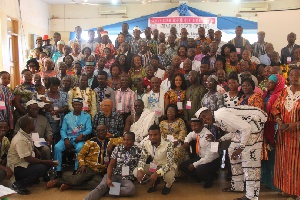 The writer with Ghana National Association of Private Schools executives at Wa in Upper West
The writer with Ghana National Association of Private Schools executives at Wa in Upper West
Throughout one’s life we are engaged in the process of forming our ideas and values – and applying them on a daily basis. Whether we like it or not – and whether we know it or not – our experiences are shaped precisely by the societal habits imposed upon us. We observe, inherit and share the common traits within the culture we live in: the people we interact with, for one, leave lasting impressions. We move back and forth within the boundaries of the examples we witness. As we say in Akan, “Koto nwo anoma”; to wit: crabs do not give birth to birds.
A culture of mindfulness in Japan
Culture entails a learning process – for better or for worse. A friend recently sent me an eye opening video that showed that in Japan, people act with others in mind instead of thinking only of themselves. Everyone habitually does the right thing to make life easier for the next person. For example, you can enjoy clean streets because people don’t litter. You can feel like royalty because people will serve you with a smile and a bow. The culture of respect creates an unbelievably safe atmosphere that can be seen as sheer miracles in undisciplined societies.
In a busy café, for example, you can leave your phone or laptop and not have it stolen. You can park your bike outside, and it would be there when you return. You can even find scooters on the streets with keys in the ignition. When you cultivate a culture where people are mindful of others, life is better for everyone in that society. And what better way to teach children than by the power of sheer examples!
The video clip corroborated what was seen on television during the 2018 FIFA world cup in Russia. First, the supporters of the Japanese team were seen picking up after themselves in the stands after each game, even when they lost. Second, the Japanese team itself was seen cleaning and tidying up the lockers before exiting Russia to go back home. Contrasting that with the fiasco that bedeviled the Ghanaian contingent in Brazil for the 2014 FIFA World Cup, Japan offers glimpses of best practices that African countries can copy. [I used the theme in speaking to some graduating classes last June about keeping Ghana clean.]
Cognitive dissonance
Some psychologists define cognitive dissonance as a mental discomfort experienced by a person who holds – simultaneously – two contradictory beliefs, ideas, or values. The distress is triggered by a situation in which a belief of a person clashes with new evidence perceived by that person.
Others defined the dissonance as an unpleasant state of emotional tension that occurs when two thoughts or perceptions are inconsistent, which typically results from the awareness that attitudes and behaviors are in conflict. On that note, one can surmise that an undisciplined attitude conflicts with the promotion of acceptable behaviour; and like a flat tire, you can’t get very far until you change the ailing factor.
That brings to mind the struggle that children and the youth go through trying to navigate the fuzzy distance between what is taught them by teachers and what the adults themselves do openly, in severe contrasts to the values or ideas being taught. Once conflicted routinely, what are children and the youth – in undisciplined societies – supposed to think, learn, or do? That is “the rub”, as William Shakespeare put it.
When moral education becomes a sham
Awareness of self, others, and the community are important factors for the daily life of schools; and the virtues must inform a holistic approach to teaching and learning. One key purpose of schools then is to aim at helping the children and the youth to be aware of societal values and beliefs as practiced – exemplarily – by the adults in any society.
However, imagine – for instance – a teacher extolling the concepts of punctuality and preparation, when the contexts revealed openly that they themselves are often late, or visibly and persistently unprepared! Or teaching the virtues of proper hygiene when there are neither clean toilets nor toilet paper in the schools! Or clean environments when the communities themselves sit in dusts and are absolutely and resolutely undetermined to do anything about it! In other words, the textbooks, the teachers, the parents, the elders in the communities are going one way and the virtues are in polar opposites.
Religious and moral education
Why, for example, has religion been allowed to deteriorate into outright lies and deception? Openly propagated by false and crafty prophets on television screens across the length and breadth of the country – is the larger society in oblivion? How long must the insidious tithe collectors be allowed to feed on people’s ignorance with promises and sham miracles?
I have often been asked by radio and television hosts what subjects to drop in lower primary considering the barrage of courses being taught at that level. My answer has often been “Religious and Moral Education”. My rationale is quite simple: Children are not wired by divinity to listen; they watch! Why impose on children the standards that the adults themselves refuse to accept and live by, and hope, rather childishly, that children will accept them? Amen!
Email: anishaffar@gmail.com
Blog: http://www.anishaffar.org